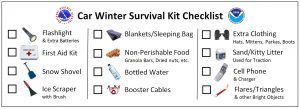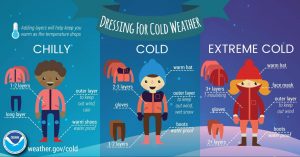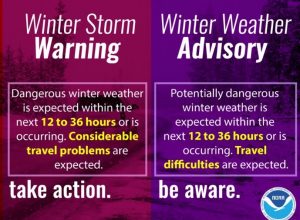State agencies encourage people to prepare for winter weather
Chronicle Media — November 25, 2020
Being prepared for winter doesn’t have to cost a lot of money or take a lot of time, according to IEMA. It could be as simple as making sure your vehicle is in good winter driving condition and adding a winter survival kit.
While the official start of winter is not for several weeks, those in Illinois know that winter weather is inevitable.
To help Illinois residents be prepared for winter weather, the Illinois Emergency Management Agency and National Weather Service developed a Winter Weather Preparedness Guide to help families prepare for extreme cold, snow and ice.
“Being unprepared for winter weather is not only inconvenient, but it can be dangerous,” said IEMA Director Alicia Tate-Nadeau. “We are encouraging all Illinoisans to take a few minutes to put together your home and vehicle emergency supply kits and review the steps you should take to stay safe during hazardous winter weather.”
A study published in 2020 by the University of Illinois Chicago found that nearly 95 percent of temperature related deaths in Illinois were due to cold weather.
According to the NWS, the coldest temperature on record occurred on Jan. 31, 2019 when the mercury dropped to negative 38 degrees near Mount Carroll in Carroll County. The previous record of negative 36 degrees was set in 1999.
Being in the cold too long can cause serious health problems. Hypothermia, or a drop in the body’s core temperature, does not require sub-arctic temperatures and can set in when you are indoors and outdoors.
Hypothermia is especially dangerous and can be fatal if not detected promptly and treated properly.
Frostbite occurs when your extremities (fingers, toes, nose, and ears) are exposed to cold weather. The skin may become stiff and numb leading to severe tissue damage. Frostbite can permanently damage the body, and severe cases can lead to amputation.

Being in the cold too long can cause serious health problems. Health experts stress common sense in dressing for the weather.
Take precautions when working outside
“Many Illinois workers, such as first-responders, public works crews and construction workers, will have to brave the outdoor elements this winter to do their jobs.” said Illinois Department of Labor Director Michael Kleinik. “It is vital for these workers to prepare ahead for severe conditions. Proper clothing is a must but making sure your body is ready for the added stress is also important.”
Hospital emergency rooms see an increase in cardiac incidents each winter. The frigid cold causes your body to go into protection mode, narrowing blood vessels. That can increase strain on the heart for those doing hard physical labor.
Preventative maintenance is a good idea. Medical professionals encourage people who must work outside regularly in the winter weather consider scheduling a physical exam before that winter work begins.
Common sense and self-awareness are the keys to winter weather safety. Workers should know the signs of hypothermia, not push their bodies to an extreme, layer clothing and make sure they have plenty of fluids to avoid dehydration.
Recognize home heating dangers
Every year, more than 400 people die in the U.S. from accidental carbon monoxide poisoning. CO is found in fumes produced any time you burn fuel in cars or trucks, small engines, stoves, lanterns, grills, fireplaces, gas ranges, or furnaces. CO can build up indoors and poison people and animals who breathe it.
“Heating equipment is one of the leading causes of home fire deaths with half of home heating fires occurring during the months of December, January and February,” said State Fire Marshal Matt Perez. “That is why it’s so important to have your furnace, wood-burning stoves, fireplaces and chimneys inspected and cleaned by licensed professionals every year.
“Test all smoke and CO alarms in the homes monthly and replace expired or broken alarms. Having these heating devices checked and serviced will help prevent fires and tragedies from occurring in our communities this winter.”
Ice and snow, take it slow
Preparing for winter also means adjusting your driving habits. Snowy or ice-coated roads and reduced visibility due to fog or blowing snow results in thousands of motor vehicle crashes every year in Illinois.
Many of these crashes can be avoided by slowing down on city streets, rural roads and highways. Traffic studies have shown that many times, minor accumulations of snow or ice on roads can be just as dangerous for motorists as major snowstorms.
“As we head into winter, the preparations and planning you do today can save your life in the months ahead,” said Acting Illinois Transportation Secretary Omer Osman. “Pack an emergency kit to store in your vehicle. Build extra time in your schedules if you are driving this winter. Give our plows and workers room to do their jobs. And always be asking yourself when the forecast calls for snow and ice: Is this trip really necessary?”
For the latest road conditions and other travel information, bookmark and follow IDOT’s www.GettingAroundIllinois.com throughout the year.
For more information about winter weather preparedness, including the Weathering Winter guide from the Illinois Department of Public Health, visit the Ready Illinois website at www.Ready.Illinois.gov.




